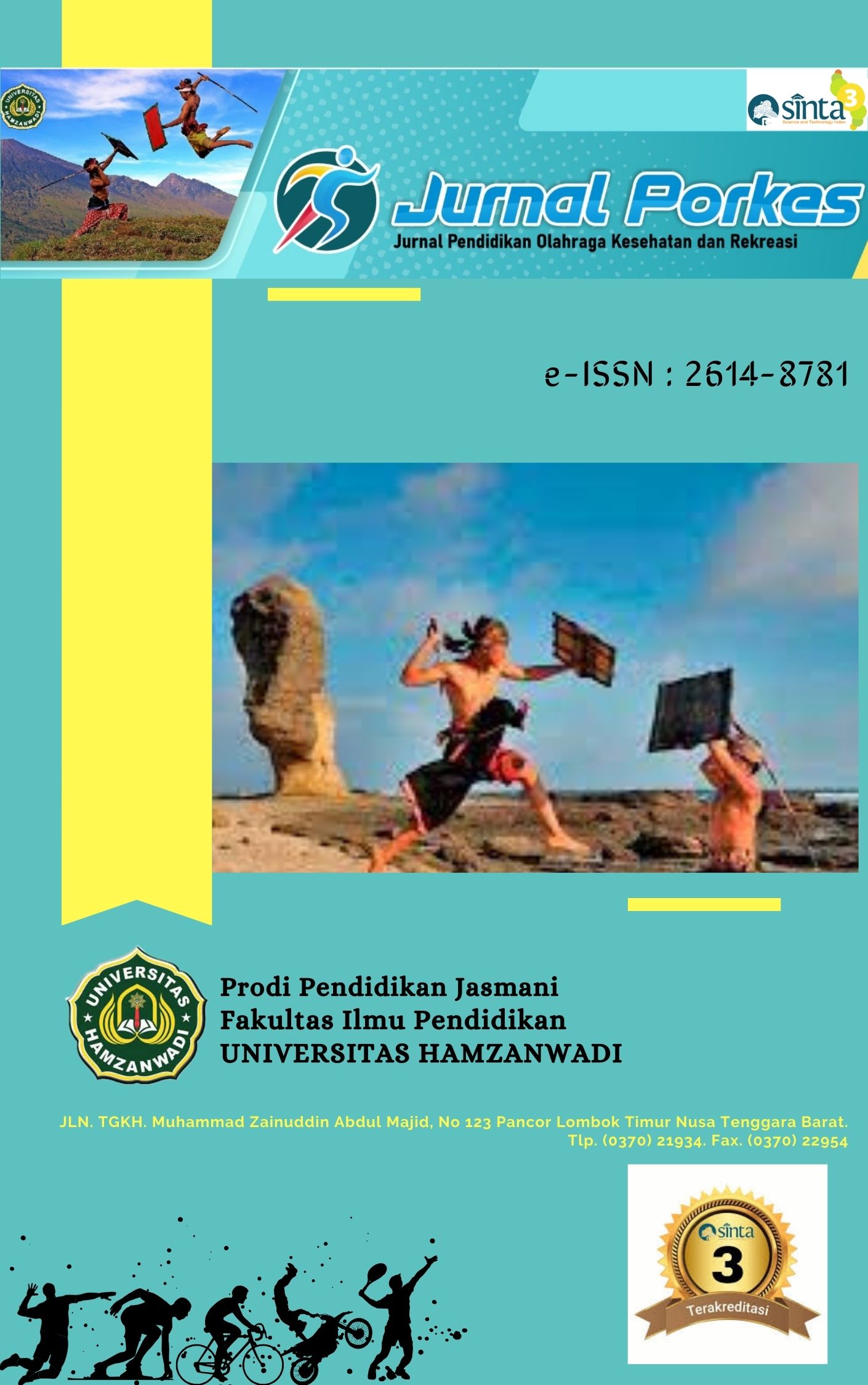The Relationship Between Parents' Socioeconomic Status and Motivation to Learn Physical Education in Elementary Schools
.
DOI:
https://doi.org/10.29408/porkes.v8i1.29952Keywords:
Socioeconomic status; learning motivation; physical education; elementary schoolAbstract
This study aims to determine the relationship between the socioeconomic status of parents and students' learning motivation in physical education subjects in elementary schools and to identify factors that influence the socioeconomic status of parents and students' learning motivation. The background of this study is based on the influence of socioeconomic status on students' access to learning facilities, especially in PE subjects that involve physical activity.In this study, the researcher used a correlational design with a mixed method research method, a sequential explanatory model with a non-probability sampling approach.. The sample of this study used a proportional stratified random sampling technique consisting of 30 fourth grade students from two elementary schools in Ganeas District, Sumedang Regency, selected according to the geographical location of the sub-district center. Data analysis was carried out using correlation statistical techniques to determine the extent to which the socio-economic status of parents influences students' learning motivation in physical education learning. The results of the study showed that there isthe relationship between the socio-economic status of parents and student learning motivation, although the relationship is not significant. The factors that influence the socio-economic status of parents on the motivation to learn physical education in elementary schools include:the economic conditions of parents in facilitating children's learning activities, social and environmental support, and internal factors within students such as interests and personal motivation.
References
Atika, N. A., Rasyid, H. (2018) The Impact of Parents' Socio-Economic Status on Children's Social Skills. Journal Pedagogika. 7(2). 111-120. https://doi.org/10.21070/pedagogia.v7i2.1601
Aziza, N, A., & Mil, S. (2021). Pengaruh Pendapatan Orang Tua terhadap Status Gizi Anak Usia 4-5 Tahun pada Masa Pandemi COVID-19. Golden Age: Scientific Journal of Early Childhood Growth and Development. 6(3), 109–120. https://doi.org/10.14421/jga.2021.63-01
Afna, Abdi, D. (2022). Relationship Between Parents' Socio-Economic Status And Learning Motivation With Students' Geography Learning Outcomes In Grade X and XI IPS SMA Negeri 12 Banda Aceh. Scientific Journal of Geography Education Students, FKIP USK, 7(20), 30–39.
Daulay, A. S. (2022). Pengaruh Kemampuan Finansial Orang Tua Siswa Terhadap Motivasi Belajar Siswa Ditinjau Secara Filosofis. At-Tazakki Jurnal Kajian Ilmu Pendidikan Islam dan Humaniora. 6(2), 365–378. https://jurnal.uinsu.ac.id/index.php/attazakki/article/view/13469
Fisalma, Y., Lele, Y, N, N., & Wartini S. (2024). Implementasi Model Atik dalam Pengembangan Kemampuan Pencak Silat Merpati Putih pada Anak Usia 5-6 Tahun di Tk Islam Quba Kembangan Jakarta Barat. Jejak Pembelajaran: Jurnal Pengembangan Pendidikan, 8(1), 120–130. https://jurnalhost.com/index.php/jpp/article/view/570
Goundar, S. (2012). Chapter 3: Research Methodology and Research Method. In S. Goundar (Ed.), Cloud Computing. Research Gate Publications.
Hendrayadi, H., Kustati, M., & Sepriyanti, N. (2023). Mixed Method Research. Journal of Education and Teaching Review (JRPP), 6(4), 2402–2410. https://journal.universitaspahlawan.ac.id/index.php/jrpp/article/view/21905
Islamiah, M., Bakri, M., & Arsyad, N, S. (2023). Pengaruh Latar Belakang Sosial Ekonomi Orang Tua Terhadap Prestasi Belajar Siswa SDN Cendrawasih I Kota Makassar. Jurnal Embrio Pendidikan. 8(1), 11–22. https://doi.org/10.52208/embrio.v8i1.443
Jailani, M. (2019) Hubungan Status Sosial Ekonomi Orang Tua Terhadap Motivasi Anak Untuk Berwirausaha. Jurnal Pedagogik Pendidikan. 14(1). 35-42. https://doi.org/10.33084/pedagogik.v14i1.835
Kasingku, J. D., & Mantow. A. (2022)Hubungan Antara Status Sosial Ekonomi dengan Pembentukan Karakter Siswa Kelas XI Sekolah Menengah Atas Unklab. Jurnal Aksara. 8(3). 1989-2002. http://dx.doi.org/10.37905/aksara.8.3.1989-2002.2022
Mulya, G., & Lengkana, A. S. (2020). Pengaruh Kepercayaan Diri, Motivasi Belajar Terhadap Prestasi Belajar Pendidikan Jasmani. Competitor: Journal of Sports Coaching Education, 12(2), 83-94. https://doi.org/10.26858/cjpko.v12i2.13781
Novita, N., Di Eriska, E., & Faridh, I. (2021). Hubungan Status Sosial Ekonomi Orang Tua dan Motivasi Belajar Siswa dengan Prestasi Belajar Pendidikan Jasmani di SMA Negeri 1 Nganjuk Tahun 2021. STAND: Journal Sports Teaching and Development, 2(2), 77-85.
Nugraha, K. A, & Nurharsono, T. (2020). Survei Sarana dan Prasarana Pendidikan Jasmani di Sekolah Dasar Kecamatan Kedu Kabupaten Temanggung Tahun 2020, 1(2), 382–388. https://journal.unnes.ac.id/sju/inapes/article/view/41585
Oktaviani, Y., Bambang, GS, & Okianna. (2021). Pengaruh Status Sosial Ekonomi Orang Tua Terhadap Motivasi Belajar di SMAN 1 Sungai Kakap. Journal Khatulistiwa, 10(9), 1–11. https://jurnal.untan.ac.id/index.php/jpdpb/article/view/49125
Pratiwi, D, E. & Prasetya, N, E. (2019). Pengaruh Status Sosial Ekonomi dan Motivasi Belajar Terhadap Prestasi Belajar Siswa Kelas V SDN Tambaksari I Surabaya. Journal Pendidikan dan Pengajaran Guru Sekolah Dasar, 2(1), 36–40. https://doi.org/10.33751/jppguseda.v2i1.993
Purba, Y. O., Fadhilaturrahmi, Purba, J. T., & Siahaan, K, W, A. (2021). Teknik Uji Instrumen Penelitian Pendidikan. Ed I. Widina Bhakti Persada Bandung (Grup CV. Widina Media Utama.
Raiyan, R., Widyanto, A., & Hatta, K. (2023). Hubungan Status Sosial Ekonomi Orang Tua dengan Prestasi Belajar Al-Quran Santri TPQ Al-Huda Kota Banda Aceh. Journal of Education and Social Science, 1(1), 51–62. https://journal.desultanah.com/index.php/desultanah/article/view/8
Rahmawati, D. (2010). Hubungan status sosial ekonomi orang tua dengan motivasi belajar PAI siswa di SMP Darussalam Ciputat.
Rahmawati, R, O, & Sayekti, I, C (2023). Pendapatan Orang Tua terhadap Minat dan Hasil Belajar Siswa Kelas V. Jurnal Ilmiah Pendidikan Profesi Guru, 6(1), 209–217. https://doi.org/10.23887/jippg.v6i1.59744
Sari, A. P., Mualif, A. & Mailani, I., (2023). The Relationship Between Parents' Socio-Economic Status and Students' Learning Motivation. Jurnal Jom Ftk Uniks, 3(2), 324–329. https://ejournal.uniks.ac.id/index.php/JOM/article/view/3031
Sari, P. (2015) Memotivasi Belajar Dengan Menggunakan E-Learning. Jurnal Ummul Qura. 6(2). 20-35. https://ejournal.kopertais4.or.id/pantura/index.php/qura/article/view/2048
Synthiawati, N. N., Faridh, I., & Eriska, E, D. (2021). Hubungan Status Sosial Ekonomi Orang Tua dan Motivasi Belajar Siswa dengan Prestasi Belajar Pendidikan Jasmani di SMA Negeri 1 Nganjuk Tahun 2021. Jurnal Pendidikan Tambusai, 5(2), 77–85. https://jptam.org/index.php/jptam/article/view/1440
Sugiyono. (2013). Metode Penelitian Pendidikan (Pendekatan Kuantitatif, Kualitatif dan R&D). Bandung: Alfabeta.
Subhaktiyasa, P., G. (2024). D Menentukan Populasi dan Sampel: Pendekatan Metodologi Penelitian Kuantitatif dan Kualitatif. Jurnal Ilmiah Profesi Pendidikan. 9(4). 2721–2731. https://doi.org/10.29303/jipp.v9i4.2657
Sudrazat, A., & Rustiawan, H. (2020). Hubungan Aktivitas Fisik dengan Keterampilan Sosial. Jurnal Terapan Ilmu Keolahragaan. 5(1), 8–15. https://ejournal.upi.edu/index.php/JTIKOR/article/view/23498
Sholihuddin, M. (2020). Internalization of Principal Curriculum Management in Primary School and Madrasah Ibtidaiyah. IJIERM: International Journal of Islamic Education, Research, and Multiculturalism, 2(3), 1–12. https://doi.org/10.47006/ijierm.v2i3.118
Taluke, J., Lesawengen, L., & Suwu AA, E. (2021). Pengaruh Status Sosial Ekonomi Orang Tua Terhadap Tingkat Keberhasilan Mahasiswa di Desa Buo Kecamatan Loloda Kabupaten Halmahera Barat. Holistik, Journal of Social and Culture, 14(2), 1–16. https://ejournal.unsrat.ac.id/index.php/holistik/article/view/33777
Thahir, M., Rachmaniar, A., & Thahir, W. (2024). Pengaruh Keterlibatan Orang Tua dalam Peningkatan Prestasi Belajar Peserta Didik. Indonesian Journal of Educational Counseling. 8(1), 99–107. https://doi.org/10.30653/001.202481.343
Williams, C. (2017). Organization and Management: Concept and Applications. Aviva Publishing House, Inc., Quezon City, 288.
Yusufi, R. C., Bachtiar, B. & Saputri, H. (2022). Sarana dan Prasarana Pendidikan Jasmani Olahraga dan Kesehatan di Sekolah Dasar. Jurnal Educatio, 8(4), 1360–1365. https://ejournal.unma.ac.id/index.php/educatio/article/view/3516
Downloads
Published
How to Cite
Issue
Section
License
Copyright (c) 2025 Nopita Nurmaya, Ayi Suherman, Encep Sudirjo

This work is licensed under a Creative Commons Attribution-ShareAlike 4.0 International License.
![]()
Jurnal Porkes is licensed under a Creative Commons Attribution-Share Alike 4.0 International License







